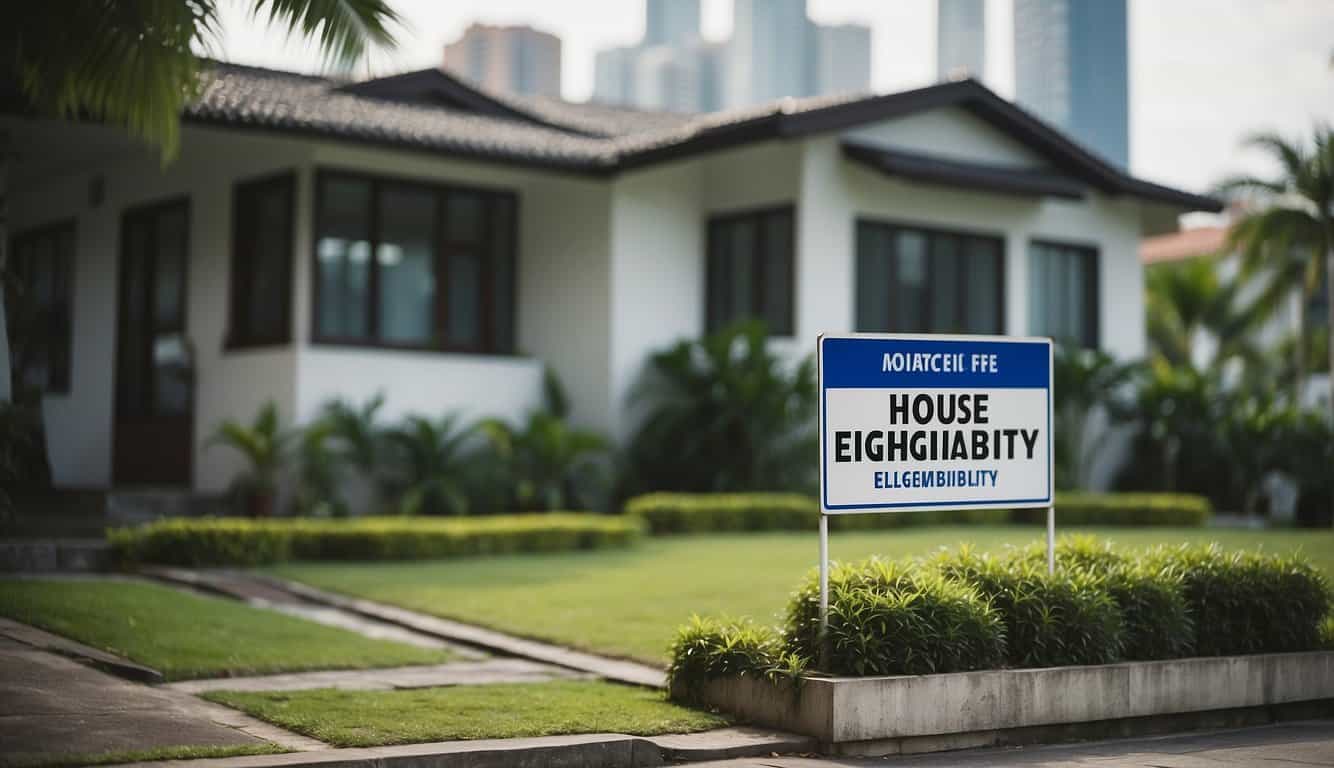Guide To Getting A Mortgage Loan in Singapore
If you’re considering buying a property in Singapore, understanding the ins and outs of home loans is crucial. Whether you’re a first-time buyer or looking to invest in real estate, navigating the world of home loans can be complex. With various banks and financial institutions offering different loan options, it’s essential to comprehend the eligibility requirements, interest rate benchmarks, and the application process.

Navigating the property market in Singapore can be challenging, but with the right knowledge, you can make informed decisions about your home loan. From HDB flats to private properties, each type of property comes with its unique loan options and considerations. Understanding the eligibility criteria and the various loan options available for different property types is essential for making the best financial decision for your circumstances. Whether you’re looking for a fixed or floating rate, there are important factors to consider when choosing the right mortgage for your home.
Key Takeaways
- Understanding the eligibility and requirements for mortgage loans in Singapore is crucial for making informed decisions.
- The different property types and loan options available can impact your choice of home loan.
- Navigating the interest rate benchmarks and adjustments is essential for securing the best mortgage deal.
Understanding Mortgage Loans in Singapore

If you’re planning to buy a home in Singapore, you’ll need to understand the ins and outs of mortgage loans. A mortgage loan is a type of home loan that allows you to borrow money to purchase a property. In Singapore, there are various types of home loans available, each with its own features, interest rates and repayment options.
Types of Home Loans
The two main types of home loans in Singapore are fixed rate and floating rate loans. Fixed rate loans have a predetermined interest rate that stays the same throughout the loan tenure, while floating rate loans have an interest rate that fluctuates with market conditions. You can also choose between HDB loans and bank loans. HDB loans are offered by the Housing Development Board, while bank loans are offered by commercial banks.
Mortgage Loan Features
Mortgage loans in Singapore come with various features that you should be aware of. For example, some loans allow you to make partial prepayments without incurring any penalty fees, while others may charge a fee for early repayment. You should also consider the loan amount, as this will affect your monthly repayments and loan tenure.
Interest Rates Explained
Interest rates are a key factor to consider when taking out a mortgage loan. Fixed rate loans have a higher interest rate than floating rate loans, but provide more stability as your repayments will remain the same throughout the loan tenure. Floating rate loans, on the other hand, have a lower interest rate that fluctuates with market conditions, which could result in higher or lower repayments depending on the market.
Loan Tenure and Repayments
The loan tenure is the length of time over which you will repay your mortgage loan. In Singapore, loan tenures can range from 5 to 35 years, depending on the loan amount and your financial situation. The longer the loan tenure, the lower your monthly repayments will be, but you’ll end up paying more in interest over the long run.
When it comes to repayments, you can choose to make monthly repayments that consist of both principal and interest, or interest-only repayments. Interest-only repayments are only available for a limited period of time, after which you’ll need to start repaying both principal and interest.
Overall, taking out a mortgage loan in Singapore can be a complex process, but with the right knowledge and preparation, you can make an informed decision that suits your needs and financial situation.
Eligibility and Requirements

If you’re considering applying for a mortgage loan in Singapore, there are certain eligibility requirements that you must meet. In this section, we’ll take a closer look at the key eligibility criteria that you need to satisfy before you can be approved for a mortgage loan.
Age and Income Considerations
First and foremost, you need to be at least 21 years old to apply for a mortgage loan in Singapore. Additionally, your gross monthly income must be at least S$2,500, and your annual gross income must be at least S$30,000. It’s worth noting that these income requirements may vary depending on the lender and the loan amount that you’re applying for.
Total Debt Servicing Ratio (TDSR) and Mortgage Servicing Ratio (MSR)
Another key factor that lenders will consider when assessing your eligibility for a mortgage loan is your Total Debt Servicing Ratio (TDSR) and Mortgage Servicing Ratio (MSR). The TDSR is the percentage of your gross monthly income that goes towards servicing all of your debt obligations, including credit card bills, car loans, and other loans. The MSR, on the other hand, is the percentage of your gross monthly income that goes towards servicing your mortgage loan.
To be eligible for a mortgage loan in Singapore, your TDSR cannot exceed 60% of your gross monthly income, and your MSR cannot exceed 30% of your gross monthly income. This means that you need to ensure that your debt obligations are manageable and that you have enough income to cover your mortgage payments.
In summary, to be eligible for a mortgage loan in Singapore, you need to be at least 21 years old, meet the minimum income requirements, and have manageable debt obligations. Additionally, you need to ensure that your TDSR and MSR are within the acceptable limits set by the lender. By meeting these requirements, you can increase your chances of being approved for a mortgage loan and achieving your dream of homeownership.
Property Types and Loan Options

If you’re looking to buy a property in Singapore, you have several options to consider. The most common types of properties are HDB flats, private properties, and Executive Condominiums (EC). Each type of property has its own loan options that you can choose from.
HDB Loans vs. Bank Loans
If you’re looking to buy an HDB flat, you have two main options for financing: HDB loans and bank loans. HDB loans are offered by the Housing and Development Board, while bank loans are offered by commercial banks. HDB loans have a fixed interest rate, which means that your monthly payments will remain the same throughout the loan tenure. Bank loans, on the other hand, can have either a fixed or a floating interest rate.
Financing for Private Properties and Executive Condominiums (EC)
If you’re looking to buy a private property or an EC, you can choose from a variety of loan options offered by commercial banks. Banks typically offer different loan packages for completed and uncompleted properties. You can also choose between fixed rate and floating rate loans. Some of the banks that offer home loans in Singapore include DBS, OCBC, UOB, Maybank, HSBC, Citibank, CIMB, Standard Chartered Bank, Bank of China, Hong Leong Finance, and RHB.
Loans for Properties Under Construction
If you’re buying a property that is still under construction, you can choose from a variety of loan options offered by commercial banks. Banks typically offer different loan packages for properties under construction and completed properties. You can also choose between fixed rate and floating rate loans.
In summary, if you’re looking to buy a property in Singapore, you have several loan options to choose from depending on the property type and whether it is completed or under construction. HDB loans are available for HDB flats, while bank loans are available for all property types. Private properties and ECs have a variety of loan options offered by commercial banks.
Interest Rate Benchmarks and Adjustments

When it comes to mortgage loans in Singapore, understanding the various interest rate benchmarks and adjustments is crucial. This knowledge will help you make informed decisions about your mortgage.
SORA, SIBOR, and FHR
In Singapore, mortgage loans are commonly pegged to benchmarks such as the Singapore Overnight Rate Average (SORA), the Singapore Interbank Offered Rate (SIBOR), and the Fixed Deposit Home Rate (FHR). SORA is gaining popularity as a benchmark due to its robustness and alignment with global standards. On the other hand, SIBOR and FHR have their own unique characteristics and are preferred by some borrowers.
Fixed vs. Floating Interest Rates
When considering a mortgage loan, you will encounter the choice between fixed and floating interest rates. With a fixed rate, your interest remains constant for a specified period, providing stability and predictability in your repayments. On the other hand, floating rates fluctuate based on the benchmark rate, potentially offering savings during low-rate environments.
Understanding these benchmarks and interest rate options will empower you to select a mortgage loan that aligns with your financial goals and risk tolerance.
The Home Loan Application Process

Are you excited about buying your dream home in Singapore? The home loan application process can be daunting, but don’t worry – we’ve got you covered. Here’s what you need to know about the home loan application process in Singapore.
Obtaining In-Principle Approval (IPA)
The first step in the home loan application process is to obtain in-principle approval (IPA) from the bank or financial institution of your choice. IPA is a conditional approval of your home loan application, subject to the bank’s verification of your income, credit score, and other factors.
To obtain IPA, you will need to submit your SingPass login details, income documents, and other supporting documents to the bank. The bank will then review your application and provide you with an IPA letter if you meet their eligibility criteria.
Documentation and Verification
Once you have obtained IPA, the next step is to submit the required documentation and undergo verification. The bank will request for documents such as your NRIC, income tax assessment, CPF statement, and valuation report.
It is important to ensure that all the documents submitted are accurate and up-to-date to avoid any delays or rejections. The bank will then verify your income, credit score, and other factors to determine your loan eligibility.
If your application is successful, the bank will provide you with a letter of offer outlining the terms and conditions of your home loan. You will need to sign and return the letter of offer to the bank to accept the loan.
In conclusion, the home loan application process in Singapore can be a smooth and hassle-free process if you are well-prepared. By obtaining IPA and submitting accurate documentation, you can increase your chances of a successful loan application and start your journey towards owning your dream home.
Refinancing and Repricing

If you have an existing mortgage loan, you may have heard of refinancing and repricing. Refinancing and repricing are two ways to change your current mortgage loan’s terms and interest rates. Here, we will discuss what refinancing and repricing are, when to consider them, and their costs and benefits.
Assessing When to Refinance
When considering refinancing or repricing your mortgage loan, it is essential to assess your current financial situation. If you are struggling to make your monthly payments, refinancing to a lower interest rate may be a viable option. Additionally, if you have a high-interest rate loan, refinancing to a lower interest rate can save you money in the long run.
Another factor to consider is the lock-in period. A lock-in period is a period where you cannot change or refinance your loan without incurring a penalty. If your current loan has a lock-in period, you may want to wait until it expires before refinancing.
Costs and Benefits of Refinancing
When refinancing your mortgage loan, there are costs involved. These costs include legal fees, valuation fees, and processing fees. However, if you refinance to a lower interest rate, you may save money on your monthly payments and interest charges, making the costs worth it in the long run.
Some banks offer free conversion when you refinance your mortgage loan. Free conversion means that you can change your loan package without incurring any fees. Additionally, some banks may offer the best home loan interest rates when you refinance, making it a great option to consider.
In conclusion, refinancing and repricing are two options to consider when you want to change your current mortgage loan’s terms and interest rates. Assessing your current financial situation and understanding the costs and benefits of refinancing can help you make an informed decision.
Additional Financial Considerations

When it comes to mortgage loans in Singapore, there are several financial considerations that you need to take into account. In this section, we will discuss two key considerations that you should keep in mind: using CPF for home loans and mortgage insurance and protection.
Using CPF for Home Loans
One of the most significant advantages of buying a home in Singapore is that you can use your Central Provident Fund (CPF) savings to finance your home purchase. CPF is a government-run savings scheme that helps Singaporeans save for their retirement, healthcare, and housing needs.
You can use your CPF savings to pay for your home loan’s down payment, monthly instalments, and mortgage insurance premiums. However, there are some limitations to how much you can use. The amount you can use depends on the value of the property, your age, and the remaining balance in your CPF account.
Mortgage Insurance and Protection
Mortgage insurance is an essential consideration when taking out a home loan. It protects you and your family from financial hardship in the event of unforeseen circumstances such as death, disability, or critical illness.
It is mandatory to take out mortgage insurance in Singapore when you take out a home loan with a bank. The insurance premium is usually a one-time payment, and you can either pay it upfront or add it to your loan amount.
In addition to mortgage insurance, you may also want to consider taking out mortgage protection insurance. This type of insurance covers your mortgage payments if you lose your job or become unable to work due to illness or injury.
It is essential to read the terms and conditions of your mortgage insurance and protection policies carefully. Make sure you understand what is covered and what is not. This will help you make an informed decision and ensure that you have adequate protection for you and your family.
Overall, when taking out a mortgage loan in Singapore, it is crucial to consider all the financial aspects involved. By doing so, you can make sure that you are getting the best deal for your needs and that you are adequately protected against any unforeseen circumstances.
Tools and Resources for Borrowers

If you’re in the market for a mortgage loan in Singapore, there are a few tools and resources that can help you make the right decision. Here are some of the best options available to you:
Mortgage Calculators and Comparison Tools
Before you apply for a mortgage, it’s important to know how much you can afford to borrow and what your monthly payments will be. That’s where mortgage calculators come in. These tools allow you to enter your loan amount, interest rate and repayment period to get an estimate of your monthly payments.
In addition to mortgage calculators, you can also use mortgage comparison tools to compare different loan packages from various banks. These tools can help you find the best deal based on your specific needs and financial situation.
Professional Advice from Mortgage Experts
While online tools can be helpful, nothing beats the advice of a mortgage expert. These professionals can provide you with personalised advice and help you navigate the complex world of mortgage loans in Singapore.
When choosing a mortgage expert, look for someone who is knowledgeable, experienced and trustworthy. They should be able to answer all of your questions and provide you with a range of options that suit your needs.
TDSR Calculator
The Total Debt Servicing Ratio (TDSR) is an important factor to consider when applying for a mortgage loan in Singapore. This ratio measures the percentage of your income that goes towards debt repayment, including your mortgage.
To calculate your TDSR, you can use a TDSR calculator. This tool takes into account your income, expenses and other debts to give you an estimate of your TDSR. This can help you determine how much you can afford to borrow and avoid overextending yourself financially.
Overall, these tools and resources can help you make informed decisions when it comes to mortgage loans in Singapore. Whether you’re a first-time buyer or a seasoned investor, taking advantage of these resources can help you find the right loan package for your needs.
Promotions and Incentives

If you’re looking for a mortgage loan in Singapore, you’ll be happy to know that many banks offer promotions and incentives to attract new customers. These promotions and incentives can help you save money and get the most out of your mortgage loan. In this section, we’ll discuss some of the most popular promotions and incentives offered by banks in Singapore.
Bank Offers and Shopping Vouchers
Many banks in Singapore offer shopping vouchers as an incentive for taking out a mortgage loan with them. These vouchers can be used at a variety of stores and can be worth hundreds of dollars. For example, Bank of China is currently offering a $500 shopping voucher for new customers who take out a mortgage loan with them. Similarly, CIMB Bank is offering a $500 shopping voucher for new customers who take out a mortgage loan with them.
In addition to shopping vouchers, some banks also offer cashback promotions. For example, HSBC is currently offering up to $3,000 cashback for new customers who take out a mortgage loan with them. These cashback promotions can help you save money and make your mortgage loan more affordable.
Referral Programmes
Many banks in Singapore also offer referral programmes as an incentive for their customers to refer new customers to them. These referral programmes can be very lucrative, with some banks offering up to $2,000 for each successful referral. For example, DBS Bank is currently offering a $2,000 cash reward for each successful referral of a new mortgage loan customer.
To participate in a referral programme, all you need to do is refer your family and friends to the bank and have them take out a mortgage loan. If they are approved for the loan, you will receive the cash reward. This can be a great way to earn some extra money while helping your loved ones get a great deal on a mortgage loan.
Overall, if you’re looking for a mortgage loan in Singapore, it’s worth taking the time to explore the promotions and incentives offered by different banks. By taking advantage of these promotions and incentives, you can save money and get the most out of your mortgage loan.
Global Perspectives

If you’re considering a mortgage loan in Singapore, it’s important to have a global perspective on the market. Comparing Singapore with UK and New Zealand markets can help you understand the similarities and differences.
Comparing Singapore with UK and New Zealand Markets
When it comes to mortgage loans, Singapore, UK and New Zealand markets have their own unique characteristics. In Singapore, the maximum loan-to-value ratio is 75%, while in the UK it can go up to 95%. On the other hand, New Zealand has a maximum loan-to-value ratio of 80%.
In terms of interest rates, Singapore has relatively low interest rates compared to the UK and New Zealand. The average interest rate for a 30-year fixed-rate mortgage in Singapore is around 1.5%, while in the UK it’s around 2.5% and in New Zealand it’s around 3.5%.
Another factor to consider is the repayment period. In Singapore, the maximum repayment period is 35 years, while in the UK it’s 40 years and in New Zealand it’s 30 years.
When it comes to eligibility criteria, all three markets have different requirements. In Singapore, you need to be a Singaporean citizen or a Permanent Resident to be eligible for a mortgage loan. In the UK and New Zealand, there are no such restrictions, but you need to meet certain income and credit score requirements.
Overall, each market has its own advantages and disadvantages, and it’s important to do your research and compare different options before making a decision.
Regulatory Environment

When it comes to mortgage loans in Singapore, the regulatory environment is robust and designed to protect both lenders and borrowers. The Monetary Authority of Singapore (MAS) oversees the regulations governing mortgage loans.
Home Loan Regulations in Singapore
In Singapore, home loan regulations are set by the MAS to ensure financial stability and consumer protection. These regulations cover aspects such as loan-to-value limits, debt servicing ratios, and interest rate caps. The MAS regularly reviews and updates these regulations to adapt to the changing economic landscape and to safeguard the interests of borrowers and lenders alike.
Under these regulations, borrowers are required to meet specific criteria to qualify for a mortgage loan. These criteria may include credit assessment, income verification, and documentation of the property being financed. The regulations also outline the responsibilities and obligations of both borrowers and lenders throughout the loan process, ensuring transparency and fairness.
Frequently Asked Questions

What’s the most thrilling deal for a home loan in Singapore right now?
If you’re looking for a home loan in Singapore, you’re in luck! There are many exciting deals available on the market right now. One of the most thrilling deals is HSBC’s home loan, which allows you to finance the purchase of a private residential property, Housing Development Board (HDB) residential property, or commercial property (under individual name) in Singapore. They also offer refinancing options for existing housing loans.
How can one calculate their potential home loan interest rate with zest?
Calculating your potential home loan interest rate can be a daunting task, but don’t worry, there are many online calculators available that can help you with this. One of the best calculators is Zest’s home loan calculator, which allows you to enter your loan amount, loan tenure, and interest rate to calculate your monthly instalments.
Is there a quick way to work out how much I might borrow for a Singaporean property?
Yes, there are many online tools available that can help you work out how much you might be able to borrow for a Singaporean property. One of the best tools is DBS’s home loan calculator, which allows you to enter your income, expenses, and other details to calculate your borrowing capacity.
Who’s offering the most competitive mortgage rates in Singapore for 2023?
There are many banks and financial institutions offering competitive mortgage rates in Singapore for 2023. However, one of the most competitive rates is offered by MortgageWise, with current home loan rates starting from the lowest 3.05% (fixed) for a minimum loan of $500,000.
Which bank’s home loan repricing option should get you buzzing with excitement?
If you’re looking for a home loan repricing option that will get you buzzing with excitement, look no further than OCBC Bank’s home loan repricing option. They offer attractive interest rates and flexible repayment options, making it easier for you to manage your finances.
Can you tell me the perks of choosing a fixed rate home loan with OCBC?
Choosing a fixed rate home loan with OCBC comes with many perks, including the peace of mind that comes with knowing exactly how much your monthly repayments will be. In addition, you’ll be protected from any interest rate hikes during the fixed rate period. OCBC also offers a variety of fixed rate home loan packages to suit your needs and budget.




